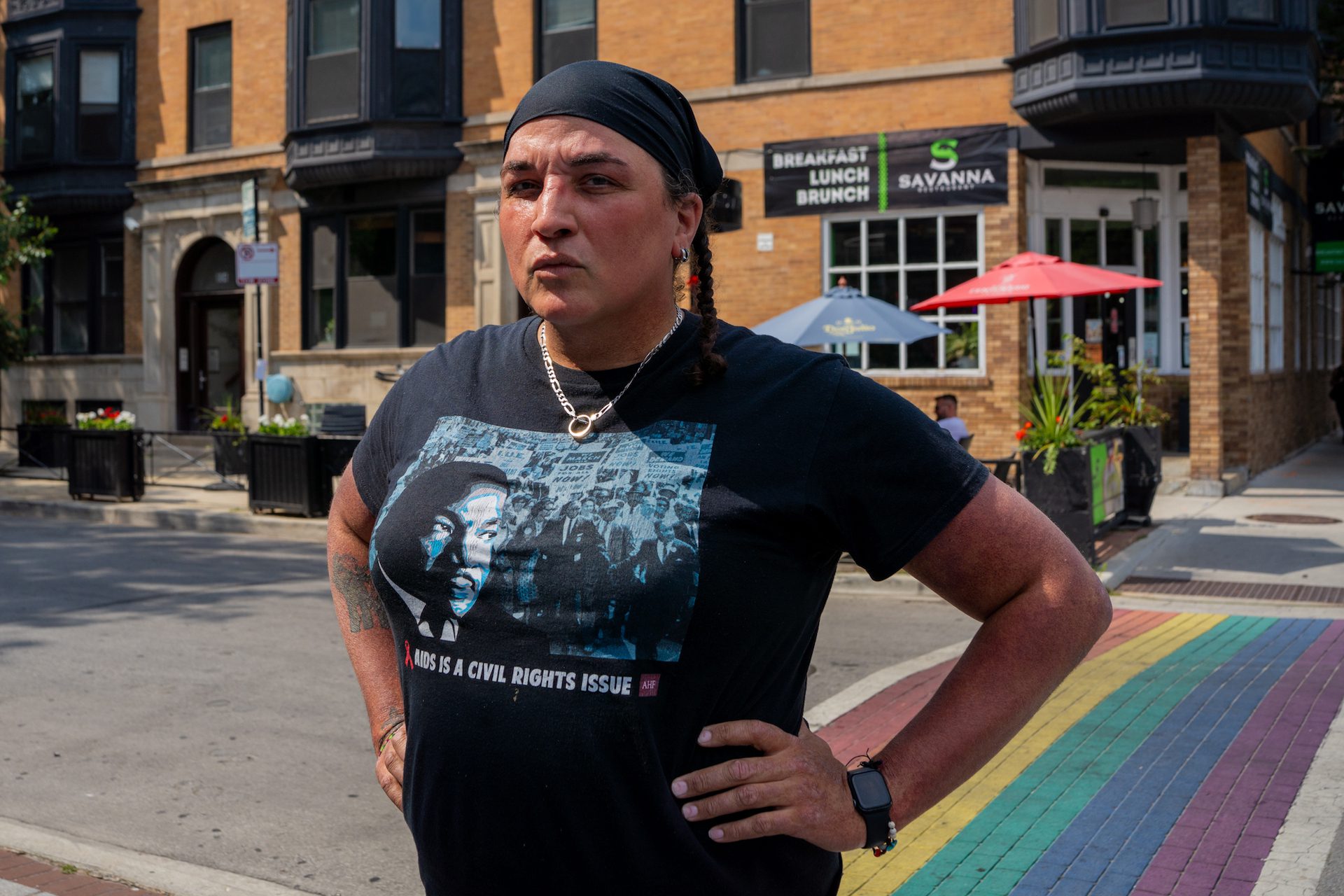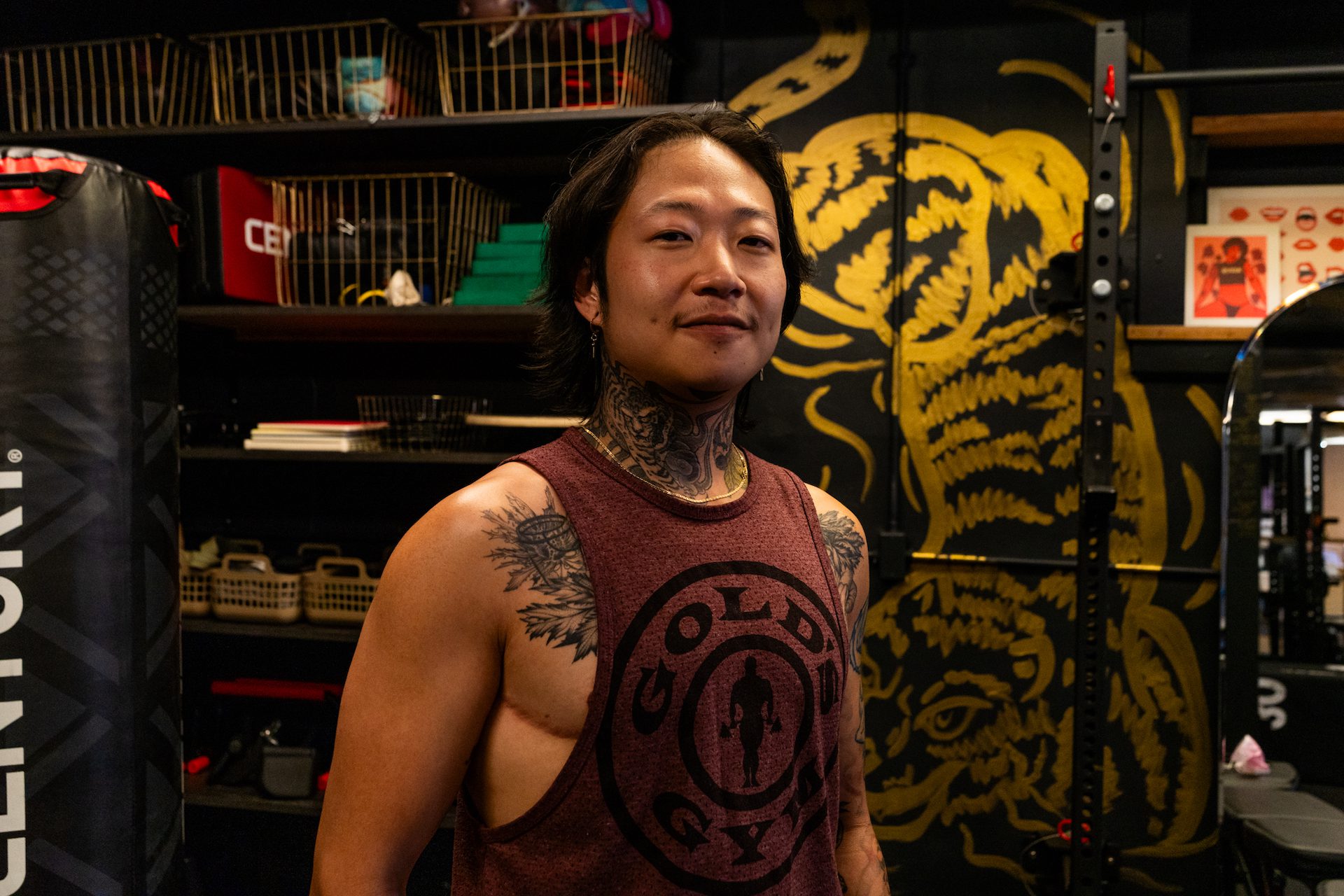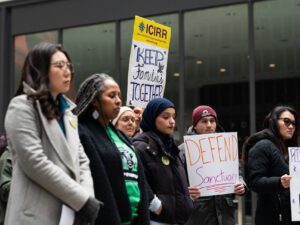 Camilla Forte/Borderless Magazine/Catchlight Local/Report for America
Camilla Forte/Borderless Magazine/Catchlight Local/Report for AmericaAs LGBTQ+ serving organizations face new threats under the Trump administration, they say they’re not giving up on their fight for visibility.
Lluvia Ramirez sorts through paperwork at the front desk while assisting people walking in and out of the clinic at the AIDS Healthcare Foundation (AHF) office in North Halsted.
Ramirez, the senior program manager for the public health division at AHF, helps connect people to health services while they wait for pending asylum applications.
In recent months, the organization has seen fewer immigrants come in for treatment at AHF, according to Ramirez.
News that puts power under the spotlight and communities at the center.
Sign up for our free newsletter and get updates twice a week.
“They are afraid to come into our clinics because they heard about ICE raids that keep people from seeking care and from taking care of themselves,” she said.
She recounted the thousands of people from South and Central America seeking asylum in the United States. Many of them waiting for asylum approval; others seeking life-saving treatment for HIV.
Over the last seven months, LGBTQ+ immigrants have faced a wave of legislation and policies that many of them argue is making it harder to get basic care. Still, community groups continue to provide resources and preserve spaces of support amid dozens of executive orders and increased ICE detention.
Trump’s anti-LGBTQ+ and Immigrant policies
Since his inauguration, President Donald Trump has signed a slew of executive orders taking aim at LGBTQ+ rights and immigration. Among some of Trump’s initial orders that could impact LGBTQ+ immigrants are:
- federal agencies only recognizing two genders that would be assigned at birth in all of their messaging and policies and end funding of “gender ideology”
- directing agencies to take steps to limit youth access to gender-affirming care;
- shutting down the by the Substance Abuse and Mental Health Services Administration’s LGBTQ suicide hotline;
- withholding federal funding from institutions that allow transgender athletes to participate in sports; and
- expansive immigration-related policy changes that included immediate apprehension at the border and eliminated “CBP One,” which previously allowed asylum seekers to schedule appointments at ports of entry.
Several states have filed lawsuits against these executive orders. Illinois recently joined over a dozen states in a lawsuit , which aims to eliminate youth access to gender-affirming care..
Organizations serving the LGBTQ+ community are also challenging Trump’s agenda, while juggling new challenges providing additional support and resources in these moments.
“[Trump’s policies] have added layers of counseling that we have to do to clients,” said Bridget Crawford, director of law and policy at Immigration Equality. “Again, there is a lot of uncertainty.”
Read More of Our Coverage
Founded over 30 years ago, Immigration Equality offers legal aid and support for LGBTQ+ immigrants. The organization was heavily involved in referring LGBTQ+ refugees to the U.S. Refugee Admissions Program (USRAP), which the Trump administration suspended in January.
Immigration Equality and AHF are part of countless organizations nationwide serving the LGBTQ+ and immigrant community that are trying to fill the gaps in healthcare access and legal support left by policies put in place by the Trump administration.
At AHF, the foundation has implemented telehealth services for patients who don’t feel comfortable visiting the clinic in person because of fears of encountering ICE. Ramirez says they hope this option helps people feel safe enough to seek the treatment they need despite fears about their legal status.
Meanwhile, other groups have expanded their services and resources to support the LGBTQ+ immigrant community in Chicago.
Life is Work, a trans-led organization that serves LGBTQ+ communities on Chicago’s West Side, has become a resource for political education, regardless of sexual orientation or legal status. Communications consultant Jae Rice says the organization aims to address misinformation and lessen the fear among marginalized communities by hosting workshops and providing resources for groups.
“When we are dealing with at-risk populations, especially trans folks…we have to be a community hub for political knowledge so that people aren’t getting misinformation,” he said.
Similarly, Minky, owner of Han Training, a trans and immigrant-owned gym, hopes their space can help marginalized people vent their frustrations and share experiences.

Since 2022, the gym has served as a fitness space for transgender and queer communities to build lasting relationships with their bodies through the use of “movement as a form of liberation.”
“Most of what I sense is the heaviness that people come in with,” said Minky, who requested only their first name be used. “It’s nice that they can always come here and they don’t have to explain anything – they can just come in and cry or be mad and everybody here gets it.”

Chicago LGBTQ+ advocacy organizations also noted an increase in the need for Know Your Rights resources for undocumented and immigrant populations.
“We are seeing an uptick in undocumented folks who need an increased amount of trust from the resources they get,” Rice said. “Trust is a resource for people.”
LGBTQ+ Groups Rally Against New Threats
Around 1.3 million adult immigrants in the United States identify as LGBTQ+, with nearly 290,000 being undocumented, according to a 2021 study from the Williams Institute at University of California, Los Angeles’s School of Law. To be eligible for asylum in the United States, an individual must show a “well-founded fear of persecution in their home country based on their race, religion, nationality, political opinion or membership in a particular social group,” according to U.S. Citizenship and Immigration Services..
Since returning to office, the Trump administration has made it more difficult for trans immigrants to obtain visas.
On his first day in office, Trump signed an executive order directing officers to deny visas based on a finding of “material misrepresentations related to an applicant’s sex or purpose of travel.” The new restrictions also require applicants to provide further evidence, like birth certificates, to show their assigned sex at birth, adding further complexity to the visa process. The order was updated by USCIS at the beginning of this month.
The State Department previously allowed people to change their sex designation on passports to match their gender identity. Trump issued the executive order suspending the policy, resulting in some people with pending passport applications having their passports withheld from them or others receiving new documentation with the wrong sex designation.
More than 1,500 transgender people or relatives have contacted the American Civil Liberties Union (ACLU) for legal support, many of whom have had their passport applications suspended or are still pending, and are concerned about getting documents that accurately reflect their identity.
Legal advocates and organizations have been pushing back both in the courtroom and on the streets. The ACLU of Massachusetts is challenging the order barring people from updating their sex designation on passports in federal court. The lawsuit challenges Trump’s policy that requires passports to list the individual’s sex assigned at birth and rejects designations that say, ‘X.’ A federal court judge offered relief and now allowed eligible individuals to correct their sex designations.
“We have a couple of transgender women who were so relieved and grateful to reach the United States because they were afraid they were going to die in their home country,” Crawford said. “Then to come here and see this vitriol, I think it’s really hard to watch.”
Travis Hooker, executive director of the LGBT Chamber of Commerce of Illinois, said that despite the funding cuts, they’ve seen an increase in support from individuals hoping to oppose the administration.
“After the election, we had such a drawback in corporate sponsorship,” Hooker said. “It has made things difficult…we have more people involved from smaller companies, and that is our bread and butter.”
Leaders of these organizations say they’ll continue to fight despite funding drawbacks and fears of the administration’s upcoming moves.
Crawford says that she’s encouraged and motivated by the community’s bravery.
“On the one hand, it is really disheartening to see these actions and the impact they have on our clients that came here for protection and safety,” she said. “At the same time, you see these acts of bravery and people who are able to overcome adversity in yet another country. That is inspiring.”
Tara Mobasher is a Northwestern Medill Reporting fellow at Borderless Magazine. Email Tara at [email protected].
Northwestern Medill reporting intern Miguel Tsang contributed to this report.


